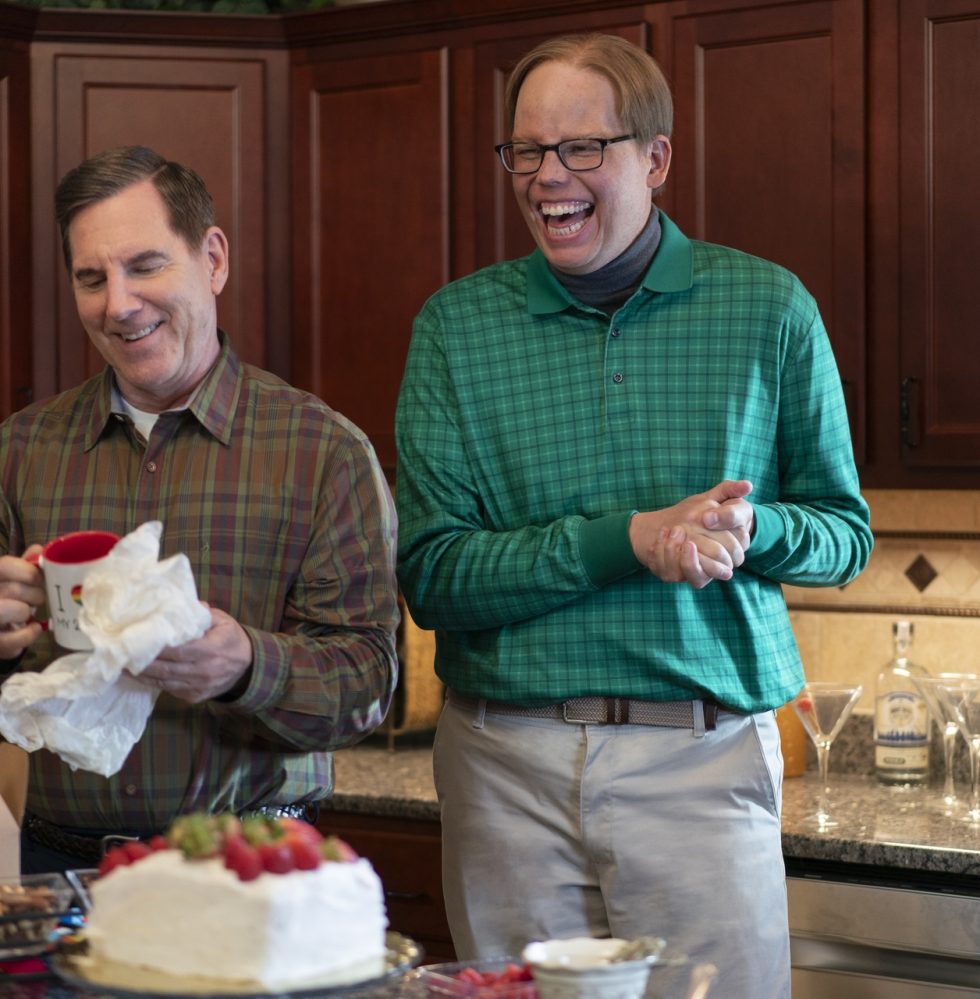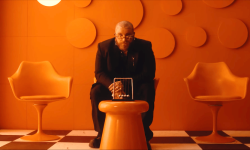
For a comedian, there is no better role than in a show that encapsulates their sense of humor, let’s them have a personal connection to the story and challenges them to show an “openness of your heart” in each performance. It’s even better when they are a fan of the show already, so it’s no surprise Tim Bagley jumped at the opportunity to join Somebody Somewhere when asked by Bridget Everett. Introduced into the series in Season 2 through his… enthusiastic performance of an Italian aria, Bagley’s character Brad grew even further in Season 3 with a heartfelt song based on his own past and a brilliantly acted, and slightly cringey, Thanksgiving dinner scene where he is forced to open up about his traumatic past by a very nosy guest. With themes of found family, something not out of place for someone in the LGBTQ+ community himself, Somebody Somewhere was a perfect fit for Bagley.

Tim Bagley singing “Danza, danza, fanciulla gentile” in ‘Somebody Somewhere
HBO
DEADLINE: You came into Somebody Somewhere in Season 2, how did you get involved with the series?

Tim Bagley
Manfred Baumann
TIM BAGLEY: Well, I got a call from Bridget asking me if I could sing and I said, “No, not really.” And she said, “Well, I want to write this role for you where you’re going to be singing an aria.” It was called “Danza, danza, fanciulla gentile”, and it’s in Italian. I googled it and I thought, well, there’s no way I could ever in a million years do this, so I hired somebody to help me figure out how to learn it, a voice teacher. And then I just did it and I learned the whole song. So, when we went to record it, she said, “We just need to do a little bit.” And I said, “Well, is it okay if I do the whole song and then you guys can just pick whatever you want?”
I thought that the funniest thing would be to see me really trying to sing my very best, even though I know it’s way beyond my scope. And so that was how it started. And then I think Bridget and Carolyn Strauss, and the writers, Paul [Thureen] and Hannah [Bos], thought, ‘he gets the humor.’ So, they just kept writing for me, and it kept happening that all along they said their hope was that they wanted to get Jeff [Hiller’s character] and me together. Joel and Brad.

Tim Bagley, Jeff Hiller and Bridget Everett in ‘Somebody Somewhere’
HBO
DEADLINE: In this season, we start off fairly quickly with that song that Brad writes with Sam. Can you talk a little bit about that song?
BAGLEY: Sure. It’s in episode two, it was directed by Rob Cohen, and again, Bridget said, “I want to have you do a part of a song.” And I was like, “Oh, boy. Okay.” I’m not really a singer, so it was scary, but it was so beautiful. She called me at one point and she said, “I heard that your partner passed away in ’95. Do you remember what you loved about him?” I said, “Well, of course I do.” I said so many things, but I said, “Just the way he looked at me, just the way he would look at me, he looked at me like nobody else ever did.” And then the next thing I knew when the script came, that was in the song.
I just remember performing it, what I did was I got my mind set. I stayed away from everybody, and I was listening to a very specific optimistic song that moves me, keeps me raw, so that when I would go do the scene, all I had to do was look at Bridget and Jeff and they were both giving me so much. We did it, I think, in two takes. It came out very easily, and I’m really proud of the work.
I really loved the acting challenge of singing that song to Joel and trying to keep it simple and honest, and open, and directly from my heart. That was my goal. I loved that acting challenge because, as a comedian, you grow up learning how to deflect that kind of stuff when your heart is tender like that. I’ve had a whole life of trying to hide all that, so as an actor, when you get the opportunity to try to show the openness of your heart, it’s just exciting. That was thrilling for me.
To be honest with you, I’m hoping that the Emmy voters acknowledge our sweet little show, because I don’t know that a lot of people saw it, but it’s a beautiful, sweet, wonderful show. I’m really proud of the work that everybody did on the show, the writers, everybody, all the actors. But I’m really proud of my work on the show. I’ve worked a long time, and I’m just really proud of what I was able to do on this beautiful show and I’m hoping that people see that.
DEADLINE: I know what you mean. I’m one of those people that started watching the show late, but I couldn’t stop as soon as I started.
BAGLEY: I’m so glad. So many people come up to me and say, “We got to it late, but we just love the show.” So, I feel like when people find it, especially in these times right now, it is such a warm blanket. It’s just a feel-good show about how it’s never too late to start over and to find who you are. And Bridget’s character finds her way through music, and she pieces together this group of outsiders who really become a family.
And there’s episode five, it’s a Thanksgiving scene, and that’s an episode where a lot of my character’s backstory comes out. But sitting around that table, she’s put together this group of outcasts. And it’s just a lovely show, and I don’t know about you, but I know for me, I live out here in LA, I’m from Michigan. And I’ve got a very small group of, really what can only be described as misfits and outcasts, that I’ve been with for years and they’re my close friends, my family out here. That’s what I think the show is.
DEADLINE: That Thanksgiving episode, I think is a perfect example of what I find really interesting about what your character brings to the show. He has a lot of this backstory and this seriousness to it, but as you were saying, you also have the humor in that he was very serious in how he sang that first song.

Tim Bagley serving Thanksgiving dinner in ‘Somebody Somewhere’
HBO
BAGLEY: Yeah. That’s a great point, Ryan. I feel like this character is on a journey after he left his wife, and she didn’t really let him see the kids as often as he’d like. And he’s on this journey to try to be his best, most authentic self. And he is just walking his walk and he meets Joel. And I really feel that it’s like, ‘well, if this works out, that’s great. I really like this guy and I want this to work out.’ But he’s going to walk his walk regardless, and I do feel like he just quietly puts one foot in front of the other and is grateful for every act of kindness that comes his way, every bit of goodness. He’s grateful for it, and I love that whole point of view.
I really enjoyed the Thanksgiving scene when all my backstory comes up. And it was interesting in the preparation of that, I had all these specifics in my mind, and I made it all very specific and very emotional.
So, we ran through it once in rehearsal, and then Lennon Parham, the director, said, “I love that you’re so emotionally connected to it,” but she said, “I want you to think that this girl is asking you irritating questions. You don’t really want to answer them. You just want to get to your mashed potatoes and gravy and your Turkey, but you’re just trying to be polite and answer them, and you’re trying to be open and all that, but that you just want to get to your mashed potatoes.” So, I’m literally just trying to get to my mashed potatoes and answering her questions. I thought it was such a great note because it’s something active that I can play as an actor, and then also, it shaped the scene in a way where you watch it and you just think, ‘why won’t this girl shut up and leave him alone? Let him get his food.’ I thought that that was really a brilliant piece of direction on Lennon’s part.
DEADLINE: That moment, it was like everybody in the room other than her, was like, “I want this woman to shut up.”
BAGLEY: Right, and to me, those moments are what’s funny about the show. It really is a comedy because there’s so much depth and darkness to it, but there’s so many moments that are just what’s really funny in life, because that is life. There’s always somebody that’s asking a really uncomfortable question or a line of questions, and you’re in the room there and you just want to say, “Shut up, Susan,” but you can’t.
DEADLINE: And when you’re looking at this backstory of the character, especially in that Thanksgiving episode when you’re talking about all this trauma, how do you reconcile this idea of this character who had to go through all this stuff, but is still this very positive, upbeat character?
BAGLEY: That’s a really thought-provoking question. I think that by nature, most people are really good and positive, and I feel like I can relate to being beaten down and having doors closed in my face, and being treated poorly, and not valued or appreciated. I can totally relate to that. And yet coming out and starting every day with a sense of hope and gratitude, and just positivity. I feel like there’s probably more people like me than not like me, and I feel like people by nature are good. Even though if you look at Instagram and all that stuff, people can just look like garbage.
I think that for the most part, people are really good. Now, that being said, I really haven’t watched the news since this election, so I’m out of a lot of it. But I do think that by nature, people are positive. And when horrible things happen to people, they rise. Look at the people from the Holocaust. I think about that all the time about how you see these interviews from Shoah, and so many of these old people are so positive about their lives and so grateful for everything. And I just think, gosh, that would be really hard to have that gratitude. But like I said, I think that most people are basically good… except for the few that are garbage.

Tim Bagley, Mary Catherine Garrison, Jennifer Mudge and Murray Hill in ‘Somebody Somewhere’
HBO
DEADLINE: Well, some people are. You can’t avoid that.
BAGLEY: No. It’s there. But certainly, the people I surround myself with, I am lucky that I have great friends and family and the people I work with, it’s very rare that I come across somebody that’s awful.
DEADLINE: I think that attests to what you’re talking about with the show, this idea of the found family, and having this group of outsiders who are your people, and the ones who are horrible, they can just stay away.
BAGLEY: That’s right, and you just don’t give them your power. I do think that that’s a common theme. I think that a lot of people make their own families, certainly in the LGBTQ+ community, that’s something that I think even young people do that. Back when I was growing up, it was a necessity. You had to have people around you that understood you and loved you, and valued you because so much negativity was coming at us back when I was younger. But I think that young people still do that, where they find their people.



